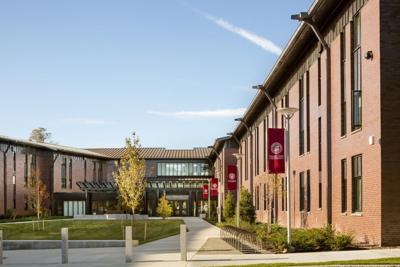
FAIRFIELD, Conn.—Sacred Heart University has received nearly $250,000 from the National Science Foundation (NSF) for a project that aims to teach advanced skills in cyberinfrastructure security to community-college students.
The NSF is an independent federal agency that funds around 25% of all federally supported, basic research conducted by national, higher-education institutions. Its grant will contribute to a nearly three-year, $500,000 collaborative project with Virginia Commonwealth University (VCU) in Richmond, VA. It is led by Sajal Bhatia, assistant professor of cybersecurity at SHU, and Irfan Ahmed, assistant professor of computer science at VCU. Two community colleges will benefit from the new curriculum: Capital Community College in Hartford and Piedmont Virginia Community College in Charlottesville, VA.
Cyberinfrastructure, a term coined by the NSF, refers to information technology systems in industry and government with heavy-duty capacities. Cybersecurity professionals are in high demand, but the supply of potential candidates is not enough to fill the positions. This project targets the shortage.
“Community colleges have students with the potential for enabling a new stream of cybersecurity professionals. These colleges, however, face significant challenges to teaching advanced cybersecurity skills for cyberinfrastructure,” said Bhatia, who also is director of cybersecurity programs at SHU’s School of Computer Science & Engineering in the Jack Welch College of Business & Technology.
According to the American Association of Community Colleges, of the 12 million undergraduates enrolled in more than 1,100 two-year colleges, the breakdown of student demographics is: 47% white, 24% Hispanic, 13% Black, and 6% Asian. Moreover, 36% are first-generation college students, 17% are single parents, and the National Center for Education Statistics identified a significant portion of these students as low-income.
One challenge is that students from many first-generation and low-income families could be less academically prepared than their peers. Additionally, these schools offer no effective cybersecurity curricula, there are limited resources to support any related classwork, and two-year community colleges have fewer required credit hours than four-year colleges. To combat this, Bhatia and Ahmed will develop hands-on modules that can be completed in four to 10 hours, and micromodules that can be completed within one to four hours, according to the National Security Agency’s National Cybersecurity Curriculum Program. These modules will be developed at beginner, intermediate and advanced levels with problem-based learning, through which students solve real world, open-ended problems.
“This project uses problem-based learning, an innovative approach to teaching cybersecurity, to bring community college students into the high rewarding cybersecurity field,” Bhatia said.
###
About Sacred Heart University
As the second-largest independent Catholic university in New England, and one of the fastest-growing in the U.S., Sacred Heart University is a national leader in shaping higher education for the 21st century. SHU offers more than 80 undergraduate, graduate, doctoral and certificate programs on its Fairfield, Conn., campus. Sacred Heart also has satellites in Connecticut, Luxembourg and Ireland and offers online programs. More than 9,000 students attend the University’s nine colleges and schools: Arts & Sciences; Communication, Media & the Arts; Social Work; Computer Science & Engineering; Health Professions; the Isabelle Farrington College of Education; the Jack Welch College of Business & Technology; the Dr. Susan L. Davis, R.N., & Richard J. Henley College of Nursing; and St. Vincent’s College. Sacred Heart stands out from other Catholic institutions as it was established and led by laity. The contemporary Catholic university is rooted in the rich Catholic intellectual tradition and the liberal arts, and at the same time cultivates students to be forward thinkers who enact change—in their own lives, professions and in their communities. The Princeton Review includes SHU in its Best 386 Colleges–2021 Edition, “Best in the Northeast” and Best Business Schools–2020 Edition. Sacred Heart is home to the award-winning, NPR-affiliated radio station, WSHU, a Division I athletics program and an impressive performing arts program that includes choir, band, dance and theater. www.sacredheart.edu